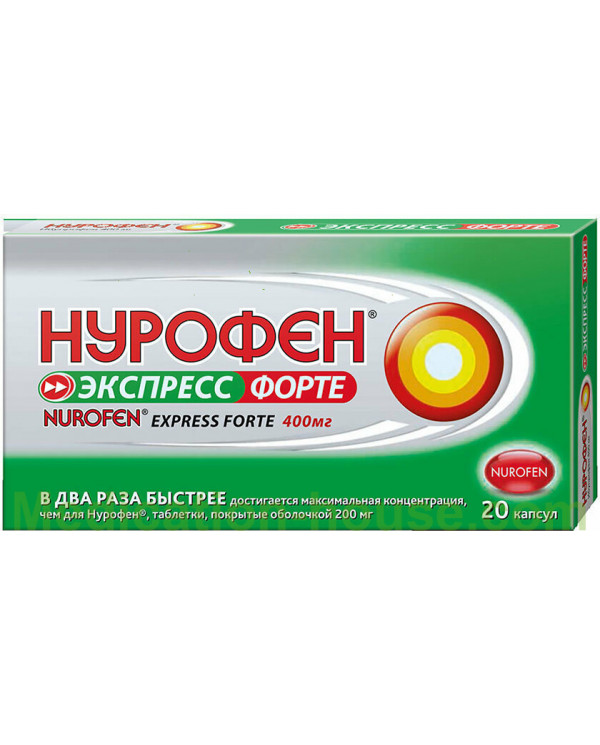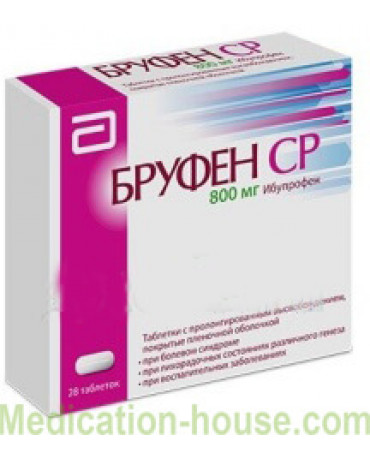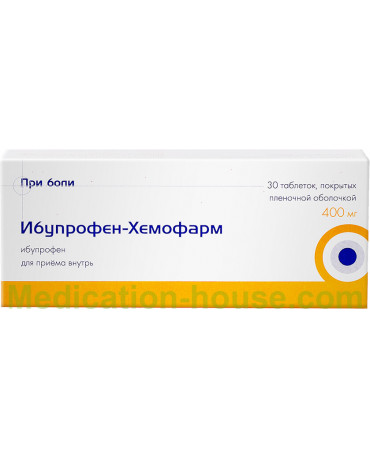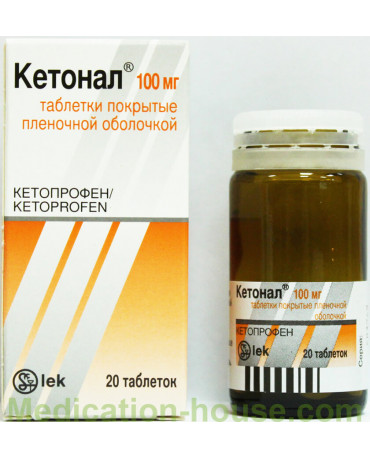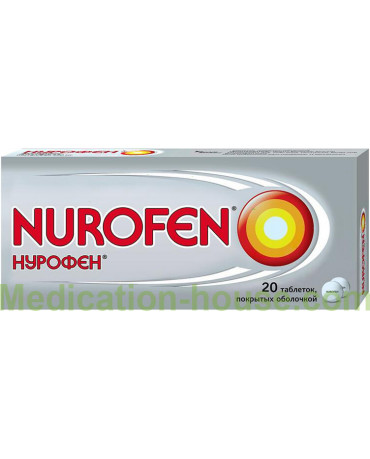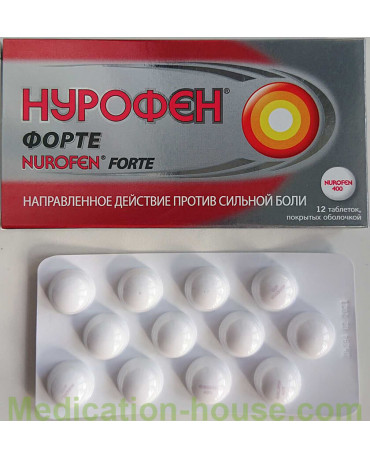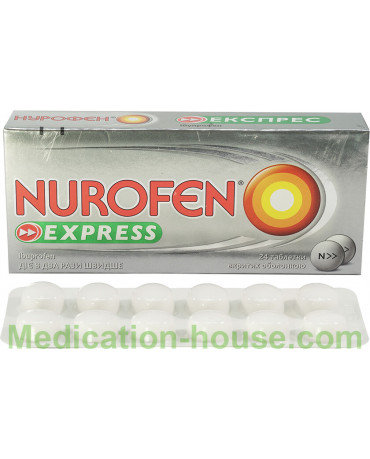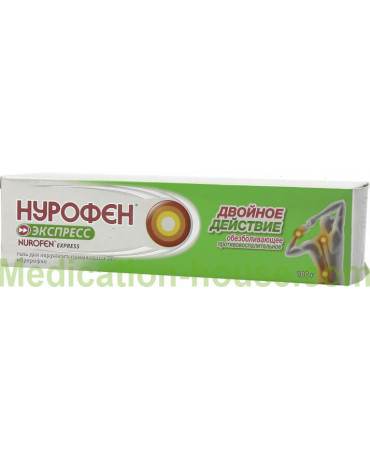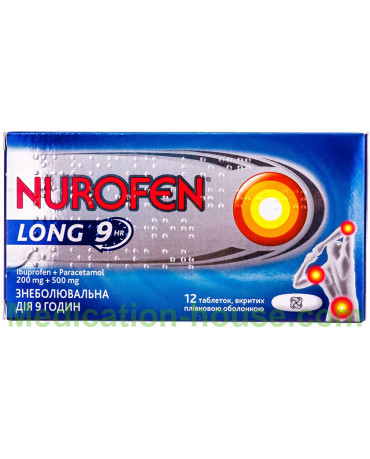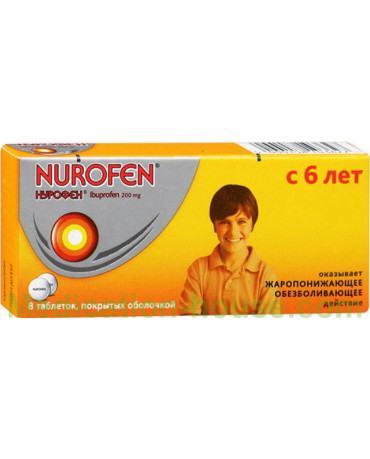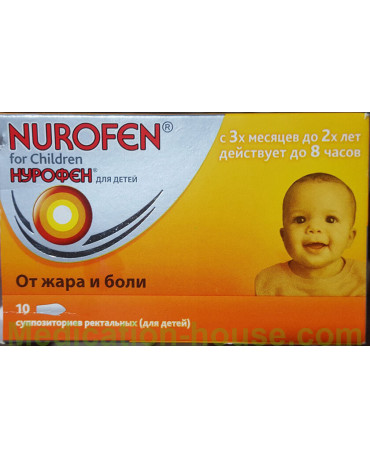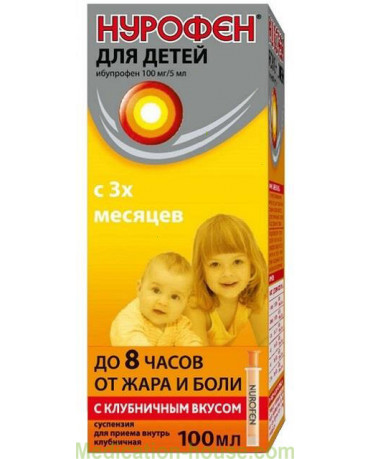Instruction for Nurofen Express Forte
You can buy Nurofen Express Forte here
Release form and composition of Nurofen Express Forte
Soft gelatin capsules, oval, translucent, red, with the identifying inscription "NUROFEN" white; the contents of the capsules are clear liquid from colorless to light pink.
1 caps
ibuprofen 400 mg
Excipients: macrogol 600 - 335.3 mg, potassium hydroxide - 44.82 mg, water - 29.88 mg.
The composition of the shell: gelatin - 197 mg, sorbitol (partially dehydrated) - 95.68 mg, water - 25.02 mg, dye crimson [Ponso 4R] (E124) - 0.79 mg, white ink [Opacode WB NS-78-18011] (water - 48 %, titanium dioxide (E171) - 29%, propylene glycol - 10%, isopropanol - 8%, hypromellose 3cP - 5%).
pharmachologic effect
The mechanism of action of ibuprofen, a derivative of propionic acid from the group of nonsteroidal anti-inflammatory drugs (NSAIDs), is due to the inhibition of the synthesis of prostaglandins - mediators of pain, inflammation and hyperthermia. Indiscriminately blocks COX-1 and COX-2, as a result of which it inhibits prostaglandn synthesis. It has a quick directional effect against pain (pain reliever), antipyretic and anti-inflammatory effect. In addition, ibuprofen reversibly inhibits platelet aggregation.
Pharmacokinetics
Suction and distribution
Absorption - high, quickly and almost completely absorbed from the gastrointestinal tract. After taking 2 capsules of Nurofen Express Forte on an empty stomach, ibuprofen is detected in the blood plasma after 15 minutes, C max of ibuprofen in the blood plasma is reached after 30-40 minutes, which is 2 times faster than after taking the equivalent dose of Nurofen in the dosage form of a 200 mg coated tablet. Taking Nurofen Express Forte with food may increase Tmax.
Plasma protein binding is more than 90%. Slowly penetrates into the cavity of the joints, lingers in the synovial fluid, creating in it greater concentrations than in the blood plasma.
Metabolism and excretion
After absorption, about 60% of the pharmacologically inactive R-form slowly transforms into the active S-form. Metabolized in the liver. T1 / 2 - 2 hours. It is excreted by the kidneys (in an unchanged form, not more than 1%) and, to a lesser extent, with bile.
In limited studies, ibuprofen has been detected in breast milk at very low concentrations.
Pharmacokinetics in Special Patient Groups
Older people did not find significant differences in the pharmacokinetic profile of the drug compared with younger people.
Indications of Nurofen Express Forte
headache;
migraine;
toothache;
painful menstruation;
neuralgia;
back pain;
muscle pain;
rheumatic pains;
Fever with colds and flu.
Dosing regimen
Carefully read the instructions before taking Nurofen Express Forte.
For oral administration. For short term use only.
Adults and children over 12 years: inside 200 mg (1 capsule) 3-4 times / day. Take the capsule without chewing, drinking water. The interval between doses of Nurofen Express Forte should be 6-8 hours.
To achieve a faster therapeutic effect in adults, the dose can be increased up to 2 capsules (400 mg) up to 3 times / day.
The maximum daily dose is 1200 mg.
The maximum daily dose for children 12-17 years old is 1000 mg.
If while taking Nurofen Express Forte for 2-3 days the symptoms persist or worsen, it is necessary to stop treatment and consult a doctor.
Side effect of Nurofen Express Forte
The risk of side effects can be minimized if the drug is taken in a short course, at the minimum effective dose needed to eliminate the symptoms.
Side effects are predominantly dose-dependent.
The following adverse reactions were observed with short-term ibuprofen in doses not exceeding 1200 mg / day (6 capsules). In the treatment of chronic conditions and long-term use may cause other adverse reactions.
The frequency of adverse reactions was estimated based on the following criteria: very often (≥1 / 10), often (from ≥1 / 100 to <1/10), infrequently (from ≥1 / 1000 to <1/100), rarely ( from ≥1 / 10,000 to <1/1000), very rarely (<1/10 000), the frequency is unknown (frequency estimates are not available).
From the side of blood and lymphatic system: very rarely - blood disorders (anemia, leukopenia, aplastic anemia, hemolytic anemia, thrombocytopenia, pancytopenia, agranulocytosis). The first symptoms of such disorders are fever, sore throat, superficial oral ulcers, flu-like symptoms, severe weakness, bleeding from the nose and subcutaneous hemorrhages, hemorrhages and hemorrhages of unknown etiology.
From the immune system: infrequently - hypersensitivity reactions - nonspecific allergic reactions and anaphylactic reactions, reactions of the respiratory tract (bronchial asthma, including its exacerbation, bronchospasm, shortness of breath, dyspnea), allergic rhinitis, eosinophilia; very rarely - severe hypersensitivity reactions, including swelling of the face, tongue and larynx, shortness of breath, tachycardia, arterial hypotension (anaphylaxis, angioedema, or severe anaphylactic shock).
On the part of the digestive system: infrequently - abdominal pain, nausea, dyspepsia (including heartburn, bloating); rarely - diarrhea, flatulence, constipation, vomiting; very rarely - peptic ulcer, perforation or gastrointestinal bleeding, melena, hematemesis, in some cases with a fatal outcome, especially in elderly patients, ulcerative stomatitis, gastritis; frequency is unknown - exacerbation of colitis and Crohn's disease.
On the part of the liver and biliary tract: very rarely - abnormal liver function (especially with prolonged use), increased activity of hepatic transaminases, hepatitis and jaundice.
From the urinary system: very rarely - acute renal failure (compensated and decompensated) especially with prolonged use, combined with an increase in plasma urea concentration and the appearance of edema, hematuria and proteinuria, nephritic syndrome, nephrotic syndrome, papillary necrosis, interstitial nephritis, cystitis.
On the part of the nervous system: infrequently - headache; very rarely - aseptic meningitis.
Since the cardiovascular system: the frequency is unknown - heart failure, peripheral edema, with prolonged use increased risk of thrombotic complications (eg, myocardial infarction), increased blood pressure.
On the part of the respiratory system: the frequency is unknown - bronchial asthma, bronchospasm, shortness of breath.
From the skin and subcutaneous tissues: infrequently - itching, hives, purpura, exfoliative and bullous dermatoses, incl. toxic epidermal necrolysis (Lyell's syndrome), Stevens-Johnson syndrome, erythema multiforme.
Other: very rarely - edema, incl. peripheral.
Laboratory indicators: hematocrit or hemoglobin (may decrease); bleeding time (may increase); plasma glucose concentration (may decrease); QC (may decrease); serum creatinine concentration (may increase); hepatic transaminase activity (may increase).
If you experience side effects, you should stop taking Nurofen Express Forte and consult a doctor.
Contraindications for Nurofen Express Forte
hypersensitivity to ibuprofen or any of the components that make up the drug;
complete or incomplete combination of asthma, recurrent nasal polyposis and paranasal sinuses, and intolerance to acetylsalicylic acid or other NSAIDs (including in history);
erosive and ulcerative diseases of the gastrointestinal tract (including gastric ulcer and duodenal ulcer, Crohn's disease, ulcerative colitis) or ulcerative bleeding in the active phase or in history (two or more confirmed episodes of peptic ulcer or ulcerative bleeding);
a bleeding or perforation of a gastrointestinal ulcer in history, provoked by the use of NSAIDs;
severe liver failure or liver disease in the active phase;
severe renal failure (CC <30 ml / min), confirmed hyperkalemia;
decompensated heart failure; the period after coronary artery bypass surgery;
cerebrovascular or other bleeding;
fructose intolerance;
hemophilia and other bleeding disorders (including hypocoagulation), hemorrhagic diathesis;
III trimester of pregnancy;
children's age up to 12 years.
Precautions for use
In the presence of the conditions indicated in this section, before using Nurofen Express Forte should consult with your doctor.
Simultaneous reception of other NSAIDs, the history of a single episode of gastric ulcer or ulcerative bleeding of the gastrointestinal tract; gastritis, enteritis, colitis, Helicobacter pylori infection, ulcerative colitis; bronchial asthma or allergic diseases in the phase of exacerbation or in the anamnesis - the development of bronchospasm is possible; systemic lupus erythematosus or mixed connective tissue disease (Sharpe syndrome) - increased risk of aseptic meningitis; renal failure, incl. with dehydration (QA less than 30-60 ml / min), nephrotic syndrome, liver failure, cirrhosis with portal hypertension, hyperbilirubinemia, arterial hypertension and / or heart failure, cerebrovascular diseases, blood diseases of unknown etiology (leukopenia and anemia), severe somatic diseases, dyslipidemia / hyperlipidemia, diabetes mellitus, peripheral arterial disease, smoking, frequent alcohol use, phenylketonuria or phenylalanine intolerance, simultaneous use of Nurofen Express Forte means that may increase the risk of ulceration or bleeding, in particular, oral GCS (including prednisolone), anticoagulants (including warfarin), selective serotonin reuptake inhibitors (including citalopram, fluoxetine , paroxetine, sertraline) or antiplatelet agents (including acetylsalicylic acid, clopidogrel), I-II trimesters of pregnancy, breastfeeding period, old age.
Use during pregnancy and lactation
Use of Nurofen Express Forte in the III trimester of pregnancy is contraindicated. The use of the drug in the I-II trimesters of pregnancy should be avoided; if necessary, the drug should be consulted with a doctor.
There is evidence that small amounts of ibuprofen can penetrate into breast milk without any negative consequences for the health of the infant, so usually with a short-term use of the need to stop breastfeeding does not occur. If necessary, long-term use of Nurofen Express Forte should consult a doctor to decide whether to stop breastfeeding for the period of use of the drug.
Information for women planning pregnancy: these drugs suppress COX and prostaglandin synthesis, affect ovulation, impairing female reproductive function (reversibly after withdrawal of treatment).
Application for violations of the liver
Nurofen Express Forte is contraindicated in severe liver failure or liver disease in the active phase.
Caution should be prescribed in the presence of concomitant liver diseases.
Application for violations of renal function
The drug is contraindicated in severe renal impairment.
Caution should be given in the presence of concomitant kidney disease.
Use in children
Contraindicated in children under 12 years.
The maximum daily dose for children and adolescents aged 12 to 17 years is 1 g.
Use in elderly patients
Be wary appoint patients older.
special instructions
It is recommended to take Nurofen Express Forte in the shortest possible course and in the minimum effective dose necessary to eliminate the symptoms.
During long-term treatment, it is necessary to control the picture of peripheral blood and the functional state of the liver and kidneys. When symptoms of gastropathy appear, careful monitoring is shown, including esophagogastroduodenoscopy, complete blood count (hemoglobin determination), fecal occult blood test. If necessary, determine the 17-ketosteroids drug should be canceled 48 hours before the study. During the treatment period, ethanol is not recommended.
Patients with renal insufficiency should consult with a physician before using the drug, because there is a risk of deterioration of the functional state of the kidneys.
For patients with arterial hypertension, incl. history, and / or chronic heart failure, you should consult with your doctor before using Nurofen Express Forte, because the drug can cause fluid retention, increased blood pressure and edema.
Influence on ability to drive motor transport and control mechanisms
Patients who notice dizziness, drowsiness, lethargy or visual impairment while taking ibuprofen, should avoid driving vehicles or driving mechanisms.
Overdose
In children, overdose symptoms may occur after taking the vine in excess of 400 mg / kg body weight. In adults, the dose-dependent effect of overdose is less pronounced. T1 / 2 drug in overdose is 1.5-3 hours.
Symptoms: nausea, vomiting, pain in the epigastric region or, rarely, diarrhea, tinnitus, headache and gastrointestinal bleeding. In more severe cases, there are manifestations of the central nervous system: drowsiness, rarely - excitement, convulsions, disorientation, coma. In cases of severe poisoning, metabolic acidosis and an increase in prothrombin time, renal failure, liver tissue damage, decreased blood pressure, respiratory depression and cyanosis can develop. Patients with bronchial asthma may worsen this disease.
Treatment: symptomatic, with the mandatory provision of airway patency, monitoring of ECG and major vital signs until the patient's condition is normalized. Oral administration of activated charcoal or gastric lavage for 1 hour after administration of a potentially toxic dose of ibuprofen is recommended. If ibuprofen has already been absorbed, an alkaline drink may be given to remove the acidic ibuprofen derivative by the kidneys, forced diuresis. Frequent or prolonged seizures should be stopped in / in the introduction of diazepam or lorazepam. With the worsening of asthma, the use of bronchodilators is recommended.
Drug interactions
The simultaneous use of ibuprofen with the following drugs should be avoided.
Acetylsalicylic acid: with the exception of low doses of acetylsalicylic acid (not more than 75 mg / day), prescribed by a doctor, because the combined use may increase the risk of side effects. With simultaneous use of ibuprofen reduces the anti-inflammatory and antiplatelet effect of acetylsalicylic acid (it is possible to increase the incidence of acute coronary insufficiency in patients receiving small doses of acetylsalicylic acid as an antiplatelet agent after starting ibuprofen).
Other NSAIDs, in particular, selective COX-2 inhibitors: the simultaneous use of two or more drugs from the NSAID group should be avoided due to the possible increase in the risk of side effects.
Use with caution simultaneously with the following drugs.
Anticoagulants and thrombolytic drugs: NSAIDs can enhance the effect of anticoagulants, in particular, warfarin and thrombolytic drugs.
Antihypertensive drugs (ACE inhibitors and angiotensin II antagonists) and diuretics: NSAIDs may decrease the effectiveness of drugs in these groups. Diuretics and ACE inhibitors can increase the nephrotoxicity of NSAIDs.
GCS: increased risk of ulceration of the gastrointestinal tract and gastrointestinal bleeding.
Antiplatelet agents and selective serotonin reuptake inhibitors: an increased risk of gastrointestinal bleeding.
Cardiac glycosides: the simultaneous appointment of NSAIDs and cardiac glycosides can lead to aggravation of heart failure, a decrease in the glomerular filtration rate and an increase in the concentration of cardiac glycosides in the blood plasma.
Lithium preparations: there are data on the likelihood of increasing the plasma concentration of lithium on the background of the use of NSAIDs.
Methotrexate: there are data on the likelihood of increasing the concentration of methotrexate in the blood plasma during the use of NSAIDs.
Cyclosporine: an increased risk of nephrotoxicity with the simultaneous appointment of NSAIDs and cyclosporine.
Mifepristone: NSAID should be started no earlier than 8-12 days after taking mifepristone, since NSAIDs can reduce the effectiveness of mifepristone.
Tacrolimus: with the simultaneous appointment of NSAIDs and tacrolimus may increase the risk of nephrotoxicity.
Zidovudine: simultaneous use of NSAIDs and zidovudine can lead to increased hematotoxicity. There is evidence of an increased risk of hemarthrosis and hematomas in HIV-positive patients with hemophilia who received joint treatment with zidovudine and ibuprofen.
Quinolone antibiotics: in patients receiving joint treatment of NSAIDs and quinolone antibiotics, the risk of seizures may increase.
Cefamundol, cefoperazone, cefotetan, valproic acid, plicamycin: an increase in the incidence of hypoprothrombinemia.
Drugs that block tubular secretion: a decrease in excretion and an increase in plasma concentration of ibuprofen.
Inductors of microsomal oxidation (phenytoin, ethanol, barbiturates, rifampicin, phenylbutazone, tricyclic antidepressants): an increase in the production of hydroxylated active metabolites, an increase in the risk of developing severe intoxications.
Inhibitors of microsomal oxidation: reducing the risk of hepatotoxic action.
Oral hypoglycemic drugs sulfonylurea derivatives and insulin: enhanced effect.
Antacids and colestyramine: reduced absorption.
Caffeine: increased analgesic effect.
Storage conditions
Nurofen Express Forte should be stored out of reach of children at a temperature not exceeding 25 ° C.
Do not use expired drug.
Shelf life - 2 years.
Terms of sell
You don't need a prescription to buy Nurofen Express Forte.

